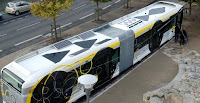We are in a pleasant way suspended in time. The lives we lived in Toronto are on hold, our responsibilities there are looked after, here they are few and we have unlimited time to do whatever we wish. It is a heady experience and much of the past three months has had a champagne feel to it. Our classes at the Toronto School of Philosophy helped us arrive in La Rochelle without dreams or preconceived notions of what life would be like. We have tried hard to live in the moment here and that has helped us savour experiences to their limit. Indeed, we can honestly say that every day has been an adventure. However, we are finding that being here has both the advantage and the inconvenience of shining a light on our lives at home. Now that we are settled, there is more time for thought and reflection. I am beginning to wonder how it was that life in Toronto so often felt stressed and hassled, that I slept badly and that there was never enough time. Was this something about me, something about life in a big city or perhaps a combination of the two? A big question and one that will take time and thought to answer. Over the past three months I have frequently been outside my comfort zone but the experiences have been so intense there hasn't been the energy for thinking this through. Now that we are settled, there will be more time to reflect and perhaps notice more changes.
On a somewhat easier plane, we have realized that there is a lot we don't know about our own country: how various processes actually work, the details of history and geography and most difficult, regional differences. I was enthusiastically describing "Canada's health care system" one day when I was interrupted (apparently not a faux pas in French conversation. They do it to each other all the time!!) with a personal story of abysmal care in rural Quebec. "Ah, yes, well, "I stumbled, "of course, health care is a provincial matter . . ." I was describing Ontario health care and possibly only Toronto health care. Federalism is a difficult concept to explain to French people. They are so firmly governed from Paris and seem amazed and somewhat horrified that standards and services could be different from province to province. Another time, someone told us they had read that divorce rates in Canada were spiraling out of control. It sounded untrue but thank goodness for the internet so we could show that in fact they are just a bit lower than in France! My indignation at our trip to the OFII made me realize that I know very little about how this experience would be for someone arriving in Canada. We know that we are seen as representatives of Canada and want to make sure that we do it well.
We knew that being away from home would bring lots of opportunities for learning about France, the French language, ourselves and our relationship. It is interesting to see what presents itself to us. We seem to swan along and then quite suddenly be hit by a difference or a custom that we don't understand or think is senseless. Sometimes we disagree between us as to what is senseless and have quite heated discussions! I think closing for lunch for at least an hour and a half is very civilized, David thinks it must contribute to much lower productivity.We both agree that dogs shouldn't be in restaurants and that their owners should be rigorously fined for not "scooping" the sidewalks. David continues to try to get his head and his mouth around "cheveux" and "chevaux" and I continue to be annoyed by people telling me I have a cute accent. I am beginning to think that I have a new French persona, "Madame Jeanette Broone" is different from Ms. Jeanette Browne. We both struggle with our different ways of handling new situations, sometimes admiring of and sometimes irritated by the other. We are surprised by how well we have managed the strain of really being each others only friend.
So here we are still smiling after three months!
Merry Christmas and Happy New Year!
May the New Year bring you health and happiness.
We are off to the Pyrenees for Christmas. No more posts until January 4, 2010.























